CENTCOM Commander Travels To Israel To Meet New IDF Chief
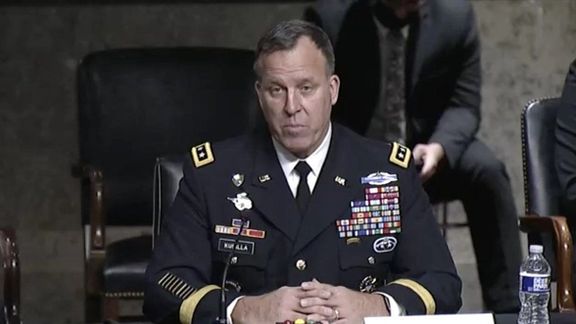
Michael Erik Kurilla, the head of the US Central Command (CENTCOM) visited Israel this week to meet with the new Chief of General Staff of Israeli military Lt. Gen. Herzi Halevi.

Michael Erik Kurilla, the head of the US Central Command (CENTCOM) visited Israel this week to meet with the new Chief of General Staff of Israeli military Lt. Gen. Herzi Halevi.
During a visit on January 16 and 17, Kurilla spoke with the new IDF commander about regional threats, opportunities to strengthen the bilateral military relationship, and upcoming training exercises between CENTCOM forces and the IDF, read a statement released on Wednesday.
Kurilla also thanked Lt. Gen. Aviv Kochavi, the outgoing IDF Chief of General Staff, for his leadership and commitment to the CENTCOM-IDF partnership. The transition of Israel from the US European Command (EUCOM) area of responsibility to that of US Central Command occurred during Kochavi’s tenure. “He quickly established the foundation for a strong, abiding relationship between the IDF and CENTCOM,” the statement added.
Kurilla also met with Defense Minister Yoav Gallant at the ministry headquarters, where they discussed the importance of deepening defense and technological cooperation between their respective militaries.
Minister Gallant expressed Israel’s commitment to expand ties with CENTCOM amid ongoing attacks by Iran and its terrorist proxies on sovereign nations – such as Lebanon’s Hezbollah against Israel or the Houthi movement in Yemen on Saudi Arabia and the United Arab Emirates – as part of the Islamic Republic’s efforts to destabilize the region.
CENTCOM’s head also visited the Israel Air Force headquarters and Air Operations Center where IAF leadership presented him with detailed briefings, demonstrations of IAF capabilities and advancements, updates on regional threats and opportunities, and an overview of integrated air and missile defense.
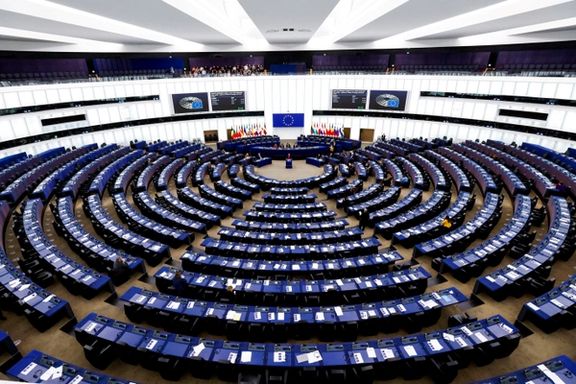
On the eve of a significant vote at the European Parliament that might eventually lead to designation of Iran’s Revolutionary Guards as terrorists, regime officials are issuing threats.
The European Parliament has been discussing a resolution to condemn the Islamic Republic’s human rights violations and its destabilizing activities, including the military support for the Russian invasion of Ukraine, since Monday. Following the plenary session to debate the listing of the IRGC, the 700 members of the body will put to vote the resolution that would call for the designation of Iran’s Guards on Thursday.
However, the resolution seems to be bound for approval as an amendment that calls for the EU and its member states to include the IRGC on the EU’s terrorist list was approved with an overwhelming majority on Wednesday. Nearly 600 members out of the 638 who were attending the session voted to adopt a phrase that “calls for the EU and its Member States to include the IRGC on the EU's terrorist list in the light of its terrorist activity, the repression of protesters and its supplying of drones to Russia.” The amendment which was proposed by the European Conservatives and Reformists group (ECR Group) has become part of the European Parliament report on the implementation of the common foreign and security policy.
The European Parliament cannot decide to designate the IRGC because the terrorists list is not a list decided by the Parliament itself but by the EU Council, comprised of ministers of each EU country. If the resolution garners enough support, it is then upon the national governments of the EU member states to make the final decision. The listing of the IRGC must have a unanimous vote by all 27 EU members in the EU Council.
The fear of listing the IRGC as a terrorist organization – similar to that the United states id in 2019 and on the agenda in the United Kingdom, seems to be a big concern for the regime -- prompting officials to threaten European countries over the consequences of such a move.
Hardliner Iranian lawmaker Mohammad Esmail Kowsari, himself a former IRGC commander, said Wednesday that Euope might not be able to withstand the consequences of such a move. “EU officials know that this conspiracy was designed upon the instigation of the US and the Zionist regime (Israel) and has no logic,” he claimed.
“The European Union and European countries must prove their independence from America and oppose any action against the IRGC; If they want to return to the JCPOA and negotiate with Iran, they know that such actions can close the door to any dialogue and negotiation,” Kowsari added. He added the IRGC is one of the most powerful military institutions and organizations in the world, such a measure cannot limit it.
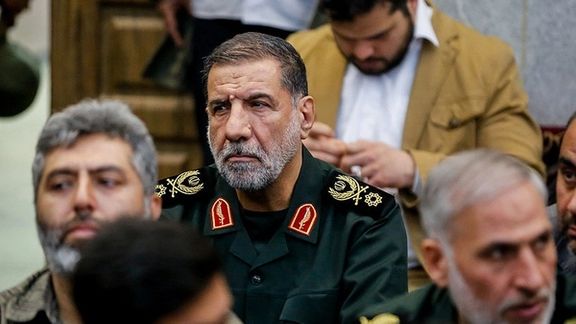
European countries prioritized diplomacy with the Islamic Republic in the hope of concluding a nuclear deal. Talks in Vienna to revive the deal, officially known as the JCPOA came to an abrupt stop in March 2022, reportedly for Iran’s insistence that the IRGC be removed from the US list of Foreign Terrorist Organizations (FTO). Later talks elsewhere failed to bring about an agreement.
Also on Wednesday, Mahmoud Nabavian, a cleric and a hardliner politician representing a constituency near Tehran at the parliament, said the European Union wants to be in line with the United States, and impose additional sanctions against the IRGC. He added that “Nowhere in the world is it customary to sanction the military force of a country,” slamming former US President Donald Trump for creating such a precedent.
Didier Reynders, the European Commissioner for Justice, once again condemned the regime’s crackdown on dissent, including the execution of protesters as well as British-Iranian national Alireza Akbari. “The internal situation in Iran continues to be a source of great concern. The current uprisings reveal deep frustration. The key demands of the current protests are respect for fundamental human rights, dignity, and real change,” he said.
“Over the past three months, the Council added 60 individuals and 8 entities to the list of those subject to restrictive measures due to their role in the death of Mahsa Amini and the violent response to the ensuing demonstrations. And let me state clearly that this approach will continue as long as necessary, as outlined in the Council Conclusions adopted in December,” he added.
Expressing support for listing IRGC as a terrorist group, European Commission President Ursula Von Der Leyen told reporters on the sidelines of the World Economic Forum in the Swiss ski resort of Davos, “The actions of the Iranian regime are atrocious and horrible, and they are trampling fundamental human rights with their feet, so it is unbelievable what we are seeing, what is happening in Iran and that needs a very strong message and a very strong reaction. And therefore, we are looking indeed at a new round of sanctions, and I would support also listing the Revolutionary Guards. I have heard several ministers asking for that and I think they are right."
The European Union is discussing a fourth round of sanctions against Tehran over the crackdown and its supply of weapons to Russia. Diplomatic sources have told Reuters that more members of the Islamic Revolutionary Guard Corps (IRGC) will be added to the sanctions list next week.
On Monday, more than 12 thousands of Iranians from across Europe gathered outside the headquarters of the European Parliament in Strasbourg in northeastern France to urge the European Union to list the IRGC as a terrorist organization.
Designating the IRGC as a terrorist group would mean that it would become a criminal offence to belong to the group, attend its meetings, and carry its logo in public.
So far over 500 protesters have been killed by security forces, mainly consisting of the IRGC and its Basij militia. Four protesters have been executed so far by the state after hasty trials devoid of any regard for due process. Others are on death row.
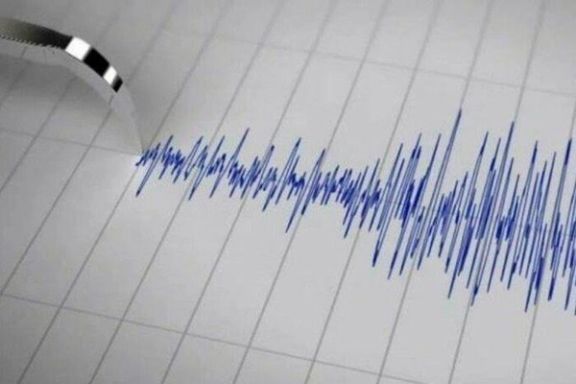
An earthquake of magnitude 5.4 has struck the northwestern Iran, in Western Azarbaijan Province Wednesday.
Iranian state media reported that rescue teams are dispatched to the quake-hit area in Khoy but have not reported any casualties yet.
Red Crescent official Morteza Moradipour told ISNA news agency that an earthquake of 5.4 magnitude hit Khoy city at 13:38 p.m.
According to him, the quake was at the depth of 12 kilometers.
He stated that about 20 minutes before the earthquake, a 3.6-magnitude foreshock was felt in the same area at a depth of 13 kilometers; therefore, the rescue teams had already been ready and dispatched to the earthquake-affected area promptly.
Iran is crisscrossed by major geological fault lines and is one of the most earthquake-prone countries in the world because it is located where the Arabian, Indian, and Eurasian tectonic plates meet.
Iran has had a terrible history of massive earthquakes in recent decades, with some killing up to tens of thousands of people and causing billions in damages, such as the magnitude 6.6 quake in Kerman province in 2003 that killed 31,000 people and flattened the ancient city of Bam.
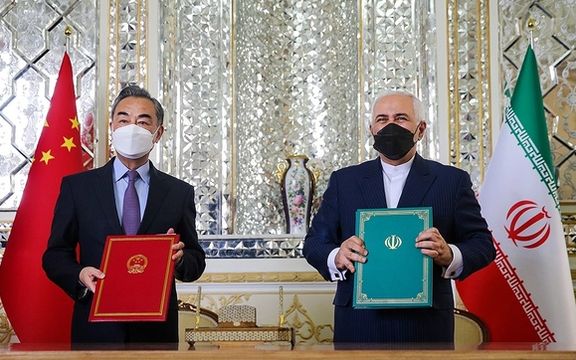
A former Iranian ambassador to China says the Tehran-Beijing 25-year agreement is overestimated and only worked as a bargaining chip for China to secure deals with Saudi Arabia.
Mohammad-Hossein Malaek, who served as Tehran’s envoy for four years under former president Mohammad Khatami, told the Iranian Labour News Agency on Tuesday that the 25-year strategic agreement is a document without any value, especially following the visit by Chinese President Xi Jinping to Saudi Arabia in December.
He noted that the visit has opened a new chapter in Iran-China relations, therefore the agreement should be revised as Tehran and Beijing had different agendas at the time the document was signed.
Malaek claimed that the agreement -- which is wrapped in mystery and so far has had little practical results – made China more interesting for Arab countries and incentivized them to give Beijing many economic and political benefits, as it was seen during the Chinese president’s recent visit to the region. W
When the document was signed, then-foreign-minister Mohammad Javad Zarif was accused of being reluctant to cooperate with China, so with signing an agreement, which does not include any practical measures and is not a binding contract, Zarif managed to exonerate himself from those accusations. “Therefore, this document is no longer the document for which they wrote stories [in Iranian media]," he said, noting that at the beginning, they made a lot of noise about the deal, but no progress has been made and “we are still at the same point.”
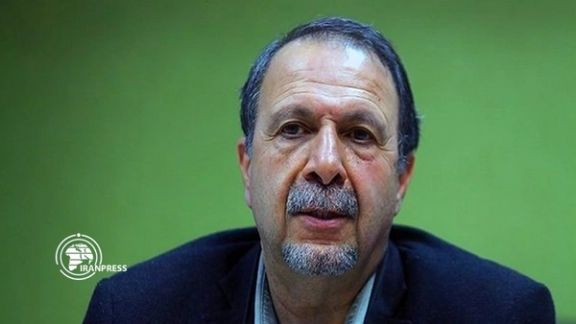
Zarif and his Chinese counterpart Wang Yi on March 27, 2021, signed the controversial 25-year deal at a ceremony at the Iranian Foreign Ministry in Tehran. The deal was first proposed by Iran's Supreme Leader Ali Khamenei during President Xi’s visit to Tehran in 2016.
The pact has been very controversial in Iran because its details have never been disclosed. A leaked copy of the final text only outlines the general terms of the agreement, but Tehran officials, beleaguered by economic crisis they cannot solve, hoped it will bring billions in investment and make Iran part of China' Belt and Road Initiative, a multi-trillion-dollar infrastructure scheme intended to stretch from East Asia to Europe. The project aims to significantly expand China's economic and political influence and has raised concerns in the United States and elsewhere.
Malaek added that the Islamic Republic needs foreign investors in the field of oil and gas, and it has nothing to do with signing the document or not. Sanctions have stopped Iran's cooperation with Western companies, and only Russian and Chinese companies may invest in the country. However, he said that China abides by the sanctions and does not violate any of them at all when it feels any threat to its own interests.
Iran has indicated its intention to rely more on Asian countries, particularly China for trade relations as talks with the United States and Europe to resolve differences over Tehran’s nuclear program have not succeeded so far and US sanctions remain in place. However, Beijing has so far has not seriously challenged US sanctions, as it has cultivated closer ties with the Persian Gulf Arab countries and Israel.
Many Iranians have expressed resentment over the 25-year cooperation agreement with China and a proposed 20-year deal with Russia, saying it is a sell-out. Although Iran has not revealed the details of the agreement with China and what it will entail in political, economic and military terms, some social media users go as far as claiming that the Islamic Republic is "selling out the country and its people" to China and Russia.
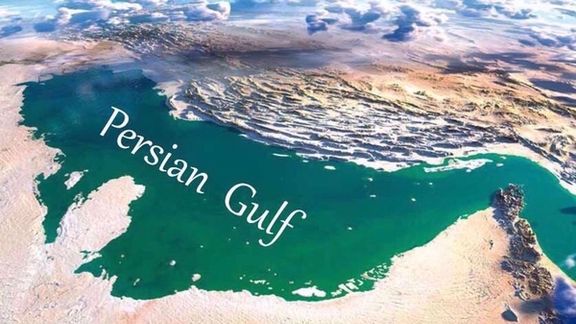
Iran's foreign ministry spokesman says Tehran has protested to Iraq over once again using “a fake misnomer” for the Persian Gulf.
Iran's foreign ministry spokesman says Tehran has protested to Iraq over once again using “a fake misnomer” for the Persian Gulf.
Responding during his press briefing Tuesday to a question over the Iraqi Prime Minister Mohammed Shia’ al-Sudani’s insistence on calling the Persian Gulf as the “Arabian” Gulf, Naser Kanaani said the foreign ministry has sent a letter of protest to the government of Iraq.
The name Persian Gulf is “a historical, permanent, documented and undeniable fact,” he said and added that “repeating the fake name does not change facts and brings no legitimacy to it.” He also alleged that Iraq was using the controversial term to appeal to “others”, presumably Iran's Arab rival Saudi Arabia.
Iran's foreign ministry usually protests if foreign officials use alternative names to refer to the Persian Gulf in view of strong feelings among Iranians over the matter who have launched petitions on various occasions to protest to the use of “Gulf” instead of “Persian Gulf” by foreign officials and media such as former US President Barack Obama and the BBC.
“Despite having strategic, fraternal, and deep relations with Iraq, we have openly conveyed our protest with regards to the issue, summoned the Iraqi ambassador and reminded the Iraqi side of the great Iranian nation’s sensitivities about the use of the precise and full term, the Persian Gulf,” Foreign Minister Hossein Amir Abdollahian said January 11 but also claimed that Al-Sudani had “corrected the matter on social media.”
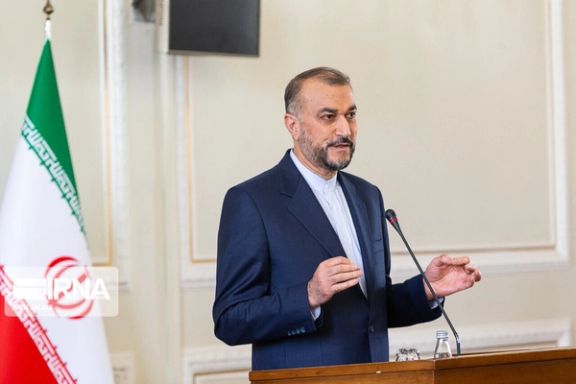
Tehran summoned the Iraqi ambassador Nasir Abdul Mohsen Abdullah to the foreign ministry on January 11 to voice its strong protest over the use of the misnomer.
At the opening ceremony of a regional football tournament, the 25th Arabian Gulf Cup, in Basra on January 6, Al-Sudani referred to the body of water separating Iran from its several Arab neighbors as the “Arabian Gulf” and despite Iran's protest, in an interview with Deutsche Welle Saturday defended his use of the controversial term and said he would not apologize to Iran for using what Kanaani referred to as a “misnomer” and “fake title”.
The historic waterway has been referred to as the Persian Gulf since ancient times including in historical Greek sources and is still referred to as such in official documents of the United Nations. Since 1960s, Arab governments have increasingly been using The Gulf or Arabian Gulf and officials of other countries and some international organizations have followed suit.
“Using the fake label for the Persian Gulf is seen in Iran as a futile attempt by the Arab neighbors to distort the region’s ancient history,” the IRGC-linked Fars news agency wrote Tuesday.
For Iraq’s prime minister using the term “Arabian Gulf” is seen by many Iranians as another sign of the Iranian regime’s costly efforts to gain influence in its neighboring country, relying on Shia proxy forces and clerics.
Some Iranian media and pundits say Al-Sudani’s insistence on using a name that he knew would irritate Iranians may be a sign that the Shia-majority Iraq is increasingly restoring its ‘Arab’ identity and getting closer to other Arab nations which are Sunnis, despite their seemingly better relations with Shia Iran over much of the past two decades.
Abdolreza Farajirad, diplomatic relations analyst, told the Iranian Labour News Agency (ILNA) Tuesday that all Iraqi premiers after Nouri al-Maleki have tried to mend their relations with the Arab world and go back to their Arab identity and culture. “For them the Arabic identity has priority and the [Shia] religious identity comes second,” he said.
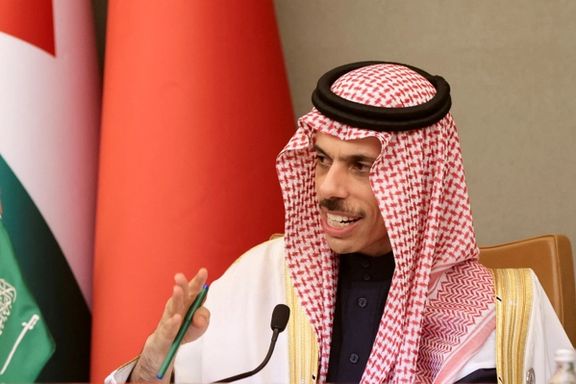
Saudi Foreign Minister Prince Faisal bin Farhan Al Saud said the kingdom was trying to find a path to dialogue with Iran as the best way to resolve differences.
He said a decision by Saudi Arabia and other Gulf states to focus on their economies and development was a "strong signal to Iran and others in the region that there is a pathway beyond traditional arguments and disputes towards joint prosperity".
Tensions spiked between Saudi Arabia and Iran after Tehran got involved in Syria’s civil war in 2011 and began building a network of proxy forces in the region.
Riyadh and Tehran cut ties in 2016 but officials from the two countries have held five rounds of direct talks hosted by Iraq since last year without achieving any diplomatic breakthroughs.
Arab states around the Persian Gulf are concerned about Iran's nuclear and ballistic missile programs and network of regional proxies but want to contain tensions as they focus on economic priorities.
"This is complex question, but we will have to talk about how we find a pathway to ending the conflict," he said.
Prince Faisal said attention on the Middle East was also needed, citing Syria as well as regional concerns over "provocative policies" by Israel's new government headed by Benjamin Netanyahu in an alliance with ultra-nationalists.
Netanyahu has pledged to pursue formal Israeli ties with Riyadh to build on normalization pacts signed with the United Arab Emirates and Bahrain in 2020 under his leadership.
Saudi Arabia blessed the US-brokered pacts but stopped short of formally recognizing Israel in the absence of a resolution to Palestinian statehood goals.
Reporting by Reuters